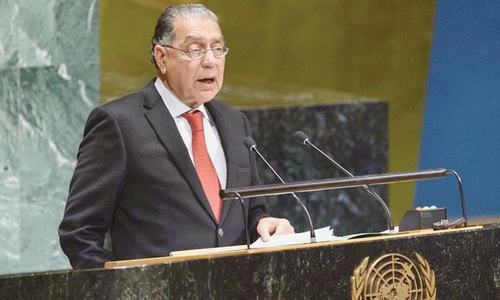UNITED NATIONS: Pakistan completed its presidency of the UN Economic and Social Council (Ecosoc) this week, successfully pushing for a consensus on debt relief and restructuring during its tenure.
Eighteen new members were elected on Monday into the Ecosoc coordinating body for the economic and social work of UN agencies and funds, for a three-year term.
Ecosoc has 54 members, which are elected each year by the General Assembly for overlapping three-year terms. Seats on the council are allocated on the basis of geographical representation. Pakistan completed its tenure on Friday.
“Ably facilitated by our colleagues from Fiji and the Netherlands, we captured the emerging consensus on debt relief and restructuring, larger concessional assistance, and the creation of new SDRs (fund allocation),” said Pakistan’s UN Ambassador Munir Akram who chaired the council during Pakistan’s tenure.
Council has 54 members, which are elected each year by General Assembly for overlapping three-year terms
During this period the international community faced the so-called “perfect storm” of economic and development challenges.
The fiercest challenge came from the Covid-19 pandemic which has taken four million lives and shattered the livelihoods of hundreds of millions of people.
The pandemic also triggered the deepest economic recession in a century, with the poor countries and the poorest people bearing the brunt of the economic and social disruption, and a reversal of a decade of development progress.
An escalating climate and environmental crisis worsened the situation, emphasising the need for realising the Paris climate goals.
“The experience of the past year has also crystallised awareness of the essential unity of humanity and imperative of international economic cooperation, which the Ecosoc is mandated to pursue by the UN Charter,” Ambassador Akram said.
During this “triple crisis” — Covid, climate and development — the Ecosoc and the UN system played a key role in ensuring an equitable distribution of the Covid vaccine.
They also persuaded the rich nations to help developing nations in coping with the crippling impact of the pandemic on their economies.
Later, the United Nations established the Covid-19 Response and Recovery Fund and the UN Global Humanitarian Response Plan, known as the RC system. The RC system and UN agencies have played a central role in helping developing countries respond coherently to the health and economic impact of the pandemic.
Published in Dawn, July 19th, 2021














































